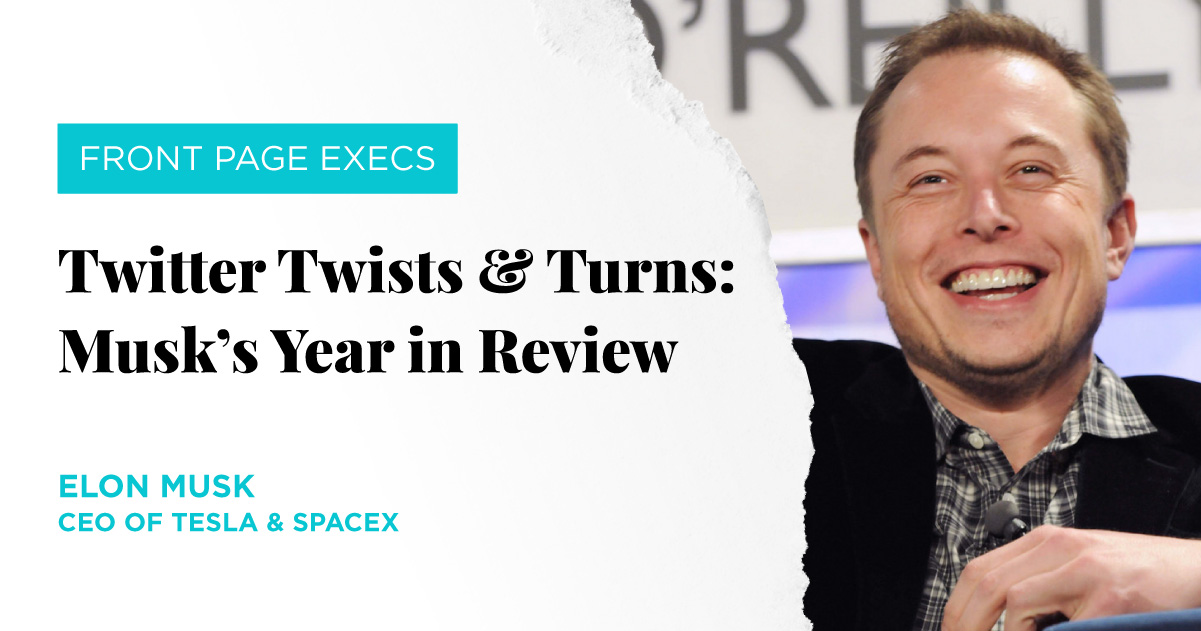Elon Musk had a busy year on social media, to say the least. The CEO of Tesla, Neuralink, and SpaceX is considered by many to be one of the most influential executives of all time, though opinion remains divided on whether this has been a benefit or a detriment to his companies’ reputations. Regardless, changes may be coming to Musk’s Twitter in 2019. On December 28th, a policy was enacted by the Securities and Exchange Commission (SEC) that says that Musk will require “pre-approval of any communications that reasonably could contain material information.” Musk was also forced to step down as the chairman of Tesla as a result of the settlement.
What were the key events that led to Musk’s Twitter restrictions in 2019? In this special New Year’s edition of Influential Executive’s Front Page Execs, we’ll take a brief look together at the ups and downs of Musk’s Twitter presence over the course of 2018, which would eventually lead to this quasi-censorship on his social media.
Musk started the year off on a relatively positive note in February, with his extravagant digital marketing stunt of launching a red Tesla Roadster into outer space becoming the second most watched live event on YouTube.
However, things quickly started to go sour on April Fools Day, when Musk joked that Tesla was bankrupt:
Tesla Goes Bankrupt
Palo Alto, California, April 1, 2018 — Despite intense efforts to raise money, including a last-ditch mass sale of Easter Eggs, we are sad to report that Tesla has gone completely and totally bankrupt. So bankrupt, you can’t believe it.— Elon Musk (@elonmusk) April 1, 2018
The tweet went out a day after Tesla’s shares dropped by 14% and many investors did not find it as funny as Musk. After the tweet went out, shares continued to drop and Musk received heavy criticism for making light of the situation.
July marked the start of a rocky summer for Musk’s Twitter. When the world had all eyes on the Thai soccer team trapped in a cave, Musk offered his submarine to assist in the rescue mission. When Vernon Unsworth, a caver who helped in the cave rescue, announced his disapproval of Musk’s submarine, Musk baselessly called him a “pedo” on Twitter. Musk, who at the time had 22 million followers, was heavily criticized by the public for the tweet and is still undergoing a defamation lawsuit.
Elon Musk’s Twitter reached a dramatic climax in August, when he famously sent this perplexing tweet:
Am considering taking Tesla private at $420. Funding secured.
— Elon Musk (@elonmusk) August 7, 2018
The tweet sent Tesla’s stock price soaring at the time, but once it had come to light that the funding was not in fact secured, the SEC soon filed a securities fraud lawsuit against Musk. This resulted in Musk being removed as the chairman of Tesla, a hefty fine, and an agreement requiring that Musk’s communications be more closely monitored.
Musk made headlines time and time again this year, but due to the immediacy and the widespread popularity of his Twitter, social media amplified each milestone dramatically. Although Musk insists that his Twitter is still as uncensored as before, we expect that his 2019 feed will prove to be much less volatile, given the extensive consequences he has had to face from this past year’s impulsive stints on social media.
Elon Musk is certainly the highest profile example of how an influential executive’s social media can not only impact their own reputation, but severely impact their business. In the right hands, a proper social media strategy can impact the business positively, but in the wrong hands, an individual may need to quite literally pay the price.


